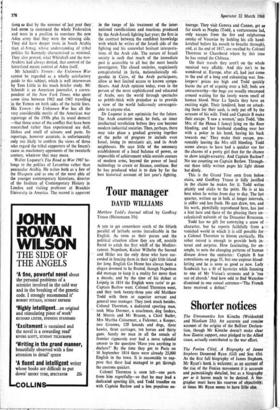Tour manager
DAVID WILLIAMS
A yen to get somewhere south of the fiftieth parallel of latitude seems ineradicable in the English. As soon as their purses and the political situation allow they are off, nostrils flared to catch the first whiff of the Mediter- ranean. Napoleon, Kaiser Wilhelm the Second and Hitler are the only three who have suc- ceeded in fencing them in their tight little island for long. English Go Home has always been a slogan doomed to be flouted, though Napoleon did manage to keep it a reality for more than a decade, and by the time of his defeat at Leipzig in 1814 the English were rarin' to go. Captain Barlow went. Colonel Thornton went, and they took twenty-three year old Matthew Todd with them as superior servant and general tour manager. They took much besides. Colonel Thornton, a dedicated sporting man, took Miss Dormer, a coachman, dog feeders, M Morris and Mr Bracon, a Chief Butler, Mrs Martha Cuissencer, a Falconer, a Keeper, two Grooms, 120 hounds and dogs, three hawks, three carriages, ten horses and thirty guns. Surely no man in all the annals of frontier rigmarole ever had a more splendid answer to the question 'Have you anything to declare?' By the time they got to Paris on 16 September 1814 there were already 25,000 English in the town. It is reasonable to sup- pose that these had managed to get through the customs quicker.
Colonel Thornton is soon left—one parts from him regretfully—so that he may lead a dedicated sporting life, and Todd trundles on with Captain Barlow and a less populous en- tourage. They visit Geneva and Cannes, get as far south as Naples (Todd, a venturesome lad, only escapes from the fire and sulphurous smoke of Vesuvius by holding his silk hand- kerchief before his mouth to breathe through), and, at the end of 1817, are recalled by Colonel Thornton to Chambord where by this time he has rented the Château.
On their travels they aren't on the whole received very affably. And this isn't to be wondered at. Europe, after all, had just come to the end of a long and exhausting war. Inn- keepers' prices are high and Todd quickly learns the art of arguing over a bill; beds are untrustworthy—the bugs are usually encamped around waiting for the lovely warm smell of human blood. Near La Spezia they have an exciting night. Their landlord, bent on attack- ing them for their cash, is only put off by the screams of his wife. Todd and Captain B make their escape. 'I saw a woman,' says Todd, `(the Mrs of the House I fancy) lying on the floor bleeding, and her husband standing over her with a poker in his hand, having his back , towards me.' They make their escape, pre- sumably leaving the Mrs still bleeding. Todd seems always to have had a quicker eye for the charms of a pretty girl than for the chance to show knight-errantry. And Captain Barlow? . No use counting on Captain Barlow. Through- out these tidily written pages his light shines but dimly.
This is the Grand Tour seen from below stairs, and Geoffrey Trease is fully justified in the claims he makes for it. Todd writes plainly and sticks to the point. He is at his best when he writes from day to day. The last quarter, written up in bulk at longer intervals, is stiffer and less fresh. He can draw, too, and his work, plentifully reproduced here, has just a hint here and there of the pleasing (here un- calculated) naivetes of the Douanier Rousseau.
Todd has no gift for conveying a sense of character, but he reports faithfully from a vanished world in which it is still possible for a Colonel Thornton to bloom exotically. His sober record is enough to provide both in- terest and surprise. How fascinating, for ex- - ample, to note the changing patterns of human disease down the centuries : Captain B has convulsions on page 51, but one copious blood- letting and he is soon as good as new. Lady Sandwich has a fit of hysterics while listening to one of Mr Vivian's sermons and is 'run out of church.' And how odd to find Waterloo dismissed in one casual sentence—`The French have received a defeat.'






































 Previous page
Previous page